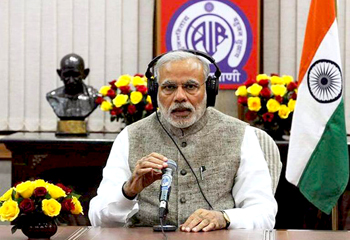New Delhi, Sep 16: The Election Commission today ruled out a "blanket ban" on Prime Minister Narendra Modi's 'Mann ki baat' radio programme amid reports that the Congress is likely to approach the poll body with such a demand alleging it "violates" the Model Code of Conduct in force due to Bihar assembly polls.
 A senior EC official said they can take "cognizance" of any such demand only after finding that the programme's contents violate the model code.
A senior EC official said they can take "cognizance" of any such demand only after finding that the programme's contents violate the model code.
A regular radio broadcast in which Modi shares his thoughts on issues, Mann ki baat's next episode will be aired on Sunday. "No blanket ban can be enforced on things like Cabinet meeting and Mann ki baat but the EC can take cognizance if the Cabinet decision or the content of programme is in violation of the Model Code of Conduct," the official said.
He, however, made it clear that he was making a "matter of fact" statement and was not aware of any such demand by the Congress or any other party.
If such a complaint is made, the election watchdog goes through the recording as well as transcript of the episode and takes a decision, he said.
A similar complaint was made by Congress against the programme during the Haryana assembly polls but the EC had not found anything "objectionable", he noted.
At the Congress briefing, party's senior spokesman Anand Sharma made a strong pitch for a ban on 'Mann ki baat' programme till the Assembly elections in Bihar are over.
"We take strong objection to the misuse of the public broadcaster for political purposes by the Prime Minister, who is the chief campaigner and face of the BJP," Sharma said.
The Congress leader said the Prime Minister should have "shown grace" and avoided the radio programme in the run up to the crucial elections.
He said the Congress and its alliance partners are approaching the EC as the Prime Minister is "thick skinned" and determined to "misuse" his office and the public broadcaster.
Noting that political parties are allotted time on the AIR and Doordarshan for reaching out to people during elections, he said the ruling party is "no exception".





Comments
Add new comment